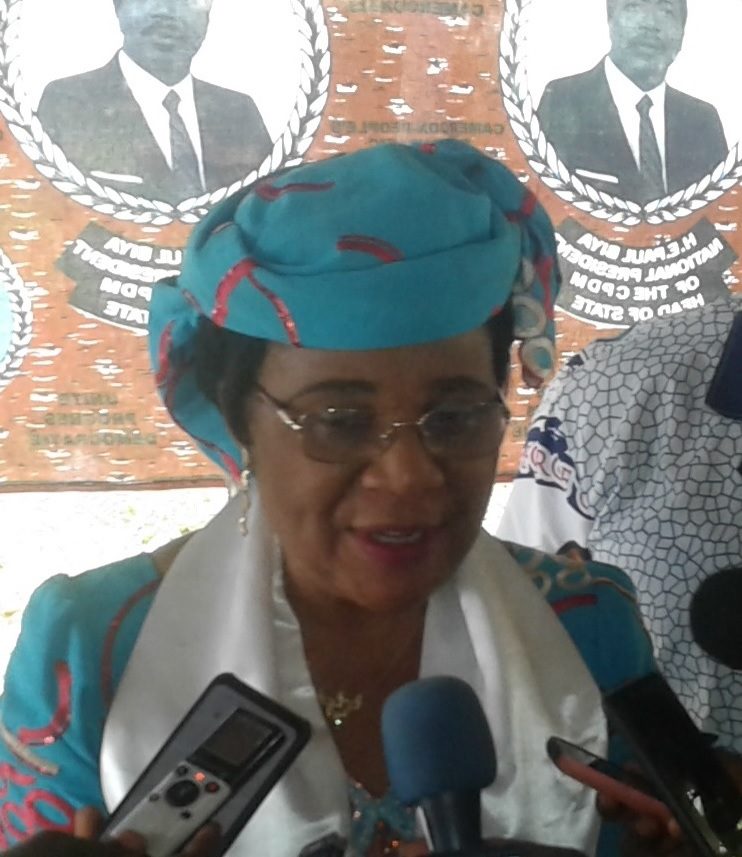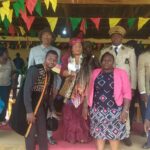The Interim President of the CPDM Momo Permanent Divisional Delegation Minister Mbah Acha Rose Fomundam in an exclusive interview shared her vision for the development of the division and her commitment to supporting the welfare of her people.
Minister Mbah Acha Rose: My recent visit to Momo Division took place just a few days ago, on 29 November. I visited the headquarters of Momo Division in Mbengwi to meet the population from all five subdivisions of Momo. I invited them and presented them with farming tools. I also awarded excellence prizes to the top three students in each end-of-course examination. The students received prizes in cash and material. The two orphanages in Momo Division also benefited from our donations. We provided equipment to two football academies and assisted bike riders. We targeted several groups, and they were all very happy.
What inspired you to undertake this initiative, knowing that you were visiting a difficult terrain?
I was appointed Minister in October 2015. A year later, the crisis began, but I have never abandoned the people of Momo Division. I have always visited them, even during the crisis. I can tell you that during the crisis, my convoy came under fire every time I visited. I have been a victim of gunshots and explosives more than eight times. However, I have never abandoned them. This is not the first time I have provided farming products or medical equipment to the people of Momo Division. I even sent a team to test the population for diabetes and other health issues. I have always been with my people. That is why, when I visited this time, I asked them how some strangers could come and organise a football tournament and distribute a few exercise books, and yet they were so excited. I wanted to show them that they are not abandoned.
How do you think the donations will impact the lives of the people in Momo Division, particularly in terms of education and economic empowerment?
In terms of education, I recognised excellence and talents by awarding prizes. This is to encourage others to work hard and attend school. We compensated schools that presented children for the examination. Not all schools have reopened, but this will attract other schools to follow suit. We rewarded teachers, inspectors, and divisional delegates to encourage them and other teachers to return to school. I encouraged the children to attend school, and I told them that I was shocked to see that they were not in uniform. Meanwhile, the SDO had informed me that there had been no gunshots in the area for the past two years. I encouraged them to start wearing their uniforms to school, as it serves as a security identifier.
What other initiatives have you planned to support the development of Momo Division and its people?
When I joined the government, there was no electricity in Ngie, and Njikwa had never had electricity. I lobbied, and Ngie now has a power supply. Njikwa will soon have electricity. Regarding roads, I succeeded in getting my colleague, the Minister of Works, to approve the grading of some roads. However, their machinery was vandalised. Now that normalcy is returning, we want to revisit the project to grade the roads to Njikwa, Ngie, Widikum, and even the stretch from Mbengwi to Batibo to be tarred. This will enable the population to travel from Mbengwi, Ngie to Batibo instead of passing through Bamenda. We have also established an oil mill in Ngie. We are trying our best to ensure that Momo Division is economically empowered.
How do you respond to critics who say that the CPDM has not done enough to support the people of Momo Division, particularly in the face of the separatist crisis?
I think very few people say that now. They know my commitment to Momo Division. I do not make promises; I deliver. Just like I did on 29 November. They saw what I did. I do not make promises; I act. Political critics will always be there, but I remain focused and committed to my goals.
What message do you think your donations and visit sent to the opposition in the area? Do you think it will have any impact on the political landscape in Momo Division?
Before I left Mbengwi, the news had spread everywhere, even to the SDF. I wonder if any opposition party can mobilise the kind of crowd that gathered on that day. I went to Mbengwi with three truckloads of gifts. I reached out to football teams, bike riders, orphanages, and many other groups. Some SDF party members are ready to defect and join the CPDM. We are ready to welcome them. We will follow up and register them.
How do you see the CPDM’s role in promoting unity and stability in Momo Division and the Northwest Region as a whole?
Everywhere I have gone, I have always said that the CPDM is a party of unity, development, and peace. It is the CPDM that has brought about development. Before I became a minister, we had opposition members of parliament for over 20 years, but they achieved nothing. We, on the other hand, have accomplished a great deal. The people have seen the difference, as evidenced by the delegation they sent to my office in Yaoundé to express their appreciation for my efforts. If I were not a member of the government, I would not have been able to achieve so much. I always emphasise that it is the CPDM government that has made a positive impact. In my speech on 29 November, I reiterated this point, stating that the CPDM is a party that stands for peace, security, and development. I also reminded them that we are one united and indivisible Cameroon that will never be divided.
What message would you like to convey to the people of Momo, and the wider population, about your commitment to their welfare and development?
I will forever support them politically, economically, and culturally. I am committed to their well-being. If you visit Momo Division and ask about me, they will tell you that I have done a lot for them. I will continue to work tirelessly for their benefit and preach peace. We can only achieve meaningful progress during times of peace. I have even extended an olive branch to my sons in the bush, referring to the armed groups. I urge them to engage in dialogue, as violence has never solved anything. Just as a husband and wife may quarrel, but ultimately reconcile and build a family, we too can resolve our differences peacefully. I implore them to lay down their arms and engage in dialogue, so that peace can reign once more.
Interview: Jude Viban



